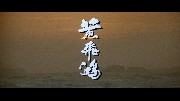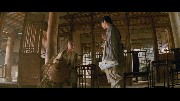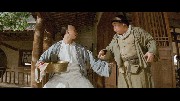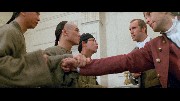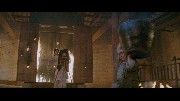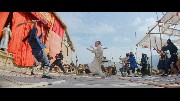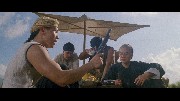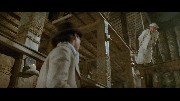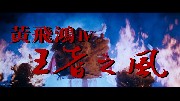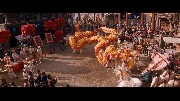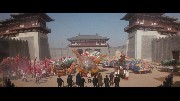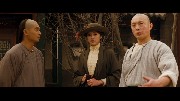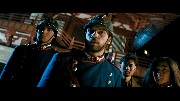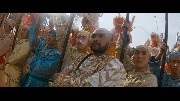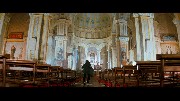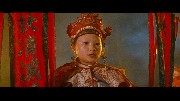Once Upon a Time in China: The Complete Films: Wong Fei Hung / Once Upon a Time (1991), Wong Fei Hung II: Nam yee tung chi keung / Once Upon a Time in China II (1992), Wong Fei Hung III: Si wong jaang ba / Once Upon a Time in China III (1993), Wong Fei Hung IV: Wong je ji fung / Once Upon a Time in China IV (1993), Wong Fei Hung chi neung: Lung shing chim pa / Once Upon a Time in China V (1994), Wong fei hung VI: Sai wik hung see / Once Upon a Time in China and America (1997) 6 x Blu-Ray Criterion Collection
on February 10th, 2022 at 17:56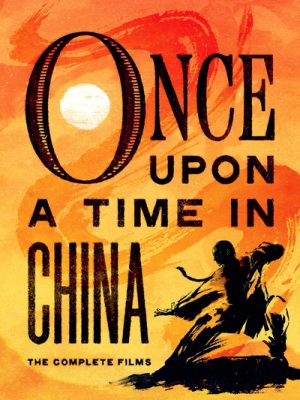
The Once Upon a Time in China franchise is regularly cited as having kickstarted the weirdly dormant martial arts film genre in the Asian market, but it's also arguable that the series helped to foster another element of "eastern" cinema that is not necessarily relegated only to China (Korean films also come to mind in this regard): a kind of "rah rah" jingoism that seeks to exploit national identity while also perhaps hinting, none too subliminally at times, that the "natives" (Chinese or otherwise) may be just a bit smarter than some of the interlopers.
Tsui Hark’s fingerprints are all over the five entries in the Once Upon a Time in China series. Tsui produced and co-wrote all the films in the series, and directed four of them. Though each can be enjoyed according to its own merits, taken together the series traces out a very specific arc both in terms of historical era and character development. Turn-of-20th-century period pieces, replete with absurdly over-the-top kung fu (not to mention wire fu) set pieces, and characterized by a broad streak of antic comedy, these films are both crowd-pleasers and sly reinterpretations of episodes in Chinese history.
The films, which were released between 1991 and 1994, focus on martial arts master and traditional Chinese medicine practitioner Wong Fei-hung, played by Jet Li in the first three installments and Vincent Zhao in the last two. Wong is a figure drawn from real life, who had been depicted previously in dozens of films and television programs as a venerable old man, so Li’s younger, more dynamic portrayal is part and parcel of Tsui’s tendency toward unconventional recontextualizations. The series’s frequent inclusion of historical figures does double duty as both a comment on a particular moment in Chinese history as well as sociopolitical aspects of contemporary Hong Kong in the leadup to its 1997 handover to China.
The series plays out the often contentious, tendentious relationship between China and the West. On one level, this is embodied at the interpersonal level through the burgeoning romance between Wong and his so-called 13th Aunt (Rosamund Kwan), who returns to town dressed in Victorian garb, fluent in English, and with a newfangled box camera in tow. In the third film, she receives an early movie camera and, in a nifty bit of self-reflexivity, some footage that she shoots is integral to exposing a murderous conspiracy. In this formulation, Wong represents a dogged traditionalism, while 13th Aunt stands for measured assimilation.

The first film, set in the late 19th century during the Qing dynasty, centers on the still timely issue of human trafficking, with unsuspecting Chinese workers being packed off to the New World for exploitation (and, in the case of the women, prostitution) by a villainous American official, Jackson (Jonathan Isgar). As in the subsequent films, the narrative is careful to balance the external threat with an internal one. In this case, it’s twofold: There’s the Shaho gang who assists Jackson, as well as rival martial arts master Iron Vest Yim (Yen Shi-kwan), who engages Wong in truly jaw-dropping combat in a ladder-filled warehouse.
The second film complicates matters by introducing the rabidly xenophobic White Lotus Sect, whose deadly attacks on Westerners and Western-leaning Chinese alike are shown as crassly terroristic. In an early scene, Wong lectures a mixed group of doctors on the virtues of acupuncture, which is shown as not only complementary to the Western understanding of the human nervous system, but also highly effective. The presence here of Sun Yat-sen, eventually the first president of the democratic Republic of China, points to contemporary democratic protests in China, especially the events in Tiananmen Square in 1989.
The third film returns more or less to the political dynamic of the first, with Wong and his acolytes doing battle—in increasingly complicated fight scenes—against various Chinese factions for first prize in a nationwide Lion Dance competition. The Big Bad here is the Russian official Tomanovsky (John Wakefield), who heads an assassination plot against the Dowager Empress. The kink in the narrative occurs in the finale, where, though he’s won the contest and defeated the plot, Wong throws down his prize in disgust at the infighting among his people.
The fourth film, directed by Yuen Bun, ups the ante with an international Lion Dance competition, while another nationalistic clan, the all-woman Red Lantern Sect, attempts to purge China of all things Western. Notably, the leader of the Red Lanterns is humanized and given something of a character arc, in sharp contrast to the purely villainous leader of the earlier White Lotus Clan. This installment features several astounding set pieces, especially the sequence where Wong infiltrates the sect’s headquarters. The fourth film also doubles down on the third’s pessimistic finale, ending with the invasion of Beijing by Western forces.
The fifth and final film in the series takes place amid the chaos of the central government’s collapse. The port town from which Wong and company hope to emigrate to Hong Kong is in utter disarray, lacking a municipal court, and beset by a local capitalist who’s charging through the roof for dwindling supplies of rice. As if this weren’t bad enough, it’s also beset by incursions from a band of pirates. The latter leads to another phenomenal action sequence set in the pirates’ cave, which has a vibe that distinctly recalls John Carpenter’s Big Trouble in Little China. Wong’s ultimate decision to stay and rebuild is indicative of his traditional Confucian outlook, and it provides a ruminative conclusion to Tsui’s sprawling, rollicking epic.
The biggest supplement here is the inclusion of a 2K transfer of Once Upon a Time in China and America, a sort of epilogue to the series that was made in 1997 and directed by Sammo Hung. It’s an uproarious oater with Jet Li back in the saddle as Wong Fei-hung that also functions as an expose of systemic racism and exploitation amid the supposedly gold-paved streets of the Wild West.
Extras:
DISC ONE Once Upon a Time in China
• A New Interpretation (HD; 15:49) is a newly done piece by Criterion featuring Tsui Hark discussing the Once Upon a Time in China series.
• Jet Li (HD; 6:07) features audio interviews conducted by producer and writer David Tadman in 2004 and 2005, and give some interesting biographical background on Li. This plays to stills, with a kind of interesting presentational conceit of Li's comments (which are in English) are presented with some whimsical fonts and movements.
• Epic Ambition (HD; 30:22) features a newly produced insightful overview of the Once Upon a Time in China series by Tony Rayns, who suggests Tsui Hark's desire to say something about "Cantonese identity" is at the heart of the films.
• Yen Shi-Kwan (HD; 7:49) features the actor giving some background information on his life and career, including his work for the Shaw Brothers.
• Behind the Scenes (HD; 2:53) is described as "likely filmed in 1990 or 1991" and show preparations for the climactic action sequence.
• Trailer (HD; 5:08)
DISC TWO Once Upon a Time in China II
• The Legend of Wong Fei-Hung (HD; 48:03) is a 2004 documentary detailing the real life story and cinematic legacy of Wong Fei- hung.
• Donnie Yen (HD; 16:29) is featured in this 2012 interview.
• Yuen Wo-ping (HD; 42:11) was filmed during the 2019 New York Asian Film Festival, and features a master class moderated by Samuel Jamier and David Wilentz, with Joanna C. Lee offering translations.
• From Spikes to Spindles (HD; 45:24) is a 1976 documentary by Christine Choy about New York City's Chinatown, but features uncredited work by Tsui Hark.
• Trailer (HD; 3:45)
DISC THREE Once Upon a Time in China III
• Tsui Hark (HD; 22:56) is an archival interview from 1994 with Tsui Hark, where he discusses the Once Upon a Time in China films.
• John Wakefield (HD; 10:54) is an interview with the actor from 2012.
• Deleted Scenes (HD: 20:43)
• Trailer (HD; 3:33)
DISC FOUR Once Upon a Time in China IV
• Double Action (HD; 12:03) is an interesting 2021 interview with editor Marco Mak, who discusses his strategy of repeating just a few frames between edits to establish fluidity and continuity in the action sequences.
• Trailer (HD; 2:04)
DISC FIVE Once Upon a Time in China V
• Daring Difference (HD; 10:06) is a 2021 interview with producer Nansun Shi, discussing Film Workshop, a production company founded in collaboration with Tsui Hark.
• Trailer (HD; 2:00)
DISC SIX Once Upon a Time in China and America
• The Making of Once Upon a Time in China and America (HD; 24:59) is an archival piece from 1997.
• Behind the Scenes (HD; 4:19) is culled from VHS-C footage shot in 1996 by Garo Nigoghossian.
• Trailer (HD; 3:53)
6xBD50 | 1080p AVC | 659 min | 237 Gb + 3% rec
Language: Cantonese
Subtitles: English
Genre: Action, Adventure, Biography, History, Romance
Once.Upon.Time.China.CC.BluRay1.part01.rar
Once.Upon.Time.China.CC.BluRay1.part02.rar
Once.Upon.Time.China.CC.BluRay1.part03.rar
Once.Upon.Time.China.CC.BluRay1.part04.rar
Once.Upon.Time.China.CC.BluRay1.part05.rar
Once.Upon.Time.China.CC.BluRay1.part06.rar
Once.Upon.Time.China.CC.BluRay1.part07.rar
Once.Upon.Time.China.CC.BluRay1.part08.rar
Once.Upon.Time.China.CC.BluRay1.part09.rar
Once.Upon.Time.China.CC.BluRay1.part10.rar
Once.Upon.Time.China.CC.BluRay2.part01.rar
Once.Upon.Time.China.CC.BluRay2.part02.rar
Once.Upon.Time.China.CC.BluRay2.part03.rar
Once.Upon.Time.China.CC.BluRay2.part04.rar
Once.Upon.Time.China.CC.BluRay2.part05.rar
Once.Upon.Time.China.CC.BluRay2.part06.rar
Once.Upon.Time.China.CC.BluRay2.part07.rar
Once.Upon.Time.China.CC.BluRay2.part08.rar
Once.Upon.Time.China.CC.BluRay2.part09.rar
Once.Upon.Time.China.CC.BluRay2.part10.rar
Once.Upon.Time.China.CC.BluRay3.part01.rar
Once.Upon.Time.China.CC.BluRay3.part02.rar
Once.Upon.Time.China.CC.BluRay3.part03.rar
Once.Upon.Time.China.CC.BluRay3.part04.rar
Once.Upon.Time.China.CC.BluRay3.part05.rar
Once.Upon.Time.China.CC.BluRay3.part06.rar
Once.Upon.Time.China.CC.BluRay3.part07.rar
Once.Upon.Time.China.CC.BluRay3.part08.rar
Once.Upon.Time.China.CC.BluRay3.part09.rar
Once.Upon.Time.China.CC.BluRay3.part10.rar
Once.Upon.Time.China.CC.BluRay4.part1.rar
Once.Upon.Time.China.CC.BluRay4.part2.rar
Once.Upon.Time.China.CC.BluRay4.part3.rar
Once.Upon.Time.China.CC.BluRay4.part4.rar
Once.Upon.Time.China.CC.BluRay4.part5.rar
Once.Upon.Time.China.CC.BluRay4.part6.rar
Once.Upon.Time.China.CC.BluRay4.part7.rar
Once.Upon.Time.China.CC.BluRay4.part8.rar
Once.Upon.Time.China.CC.BluRay5.part1.rar
Once.Upon.Time.China.CC.BluRay5.part2.rar
Once.Upon.Time.China.CC.BluRay5.part3.rar
Once.Upon.Time.China.CC.BluRay5.part4.rar
Once.Upon.Time.China.CC.BluRay5.part5.rar
Once.Upon.Time.China.CC.BluRay5.part6.rar
Once.Upon.Time.China.CC.BluRay5.part7.rar
Once.Upon.Time.China.CC.BluRay6.part01.rar
Once.Upon.Time.China.CC.BluRay6.part02.rar
Once.Upon.Time.China.CC.BluRay6.part03.rar
Once.Upon.Time.China.CC.BluRay6.part04.rar
Once.Upon.Time.China.CC.BluRay6.part05.rar
Once.Upon.Time.China.CC.BluRay6.part06.rar
Once.Upon.Time.China.CC.BluRay6.part07.rar
Once.Upon.Time.China.CC.BluRay6.part08.rar
Once.Upon.Time.China.CC.BluRay6.part09.rar
Once.Upon.Time.China.CC.BluRay6.part10.rar
